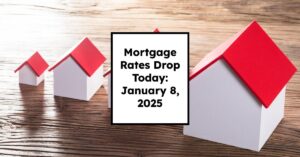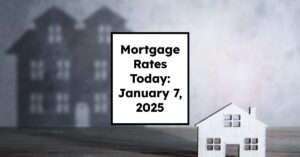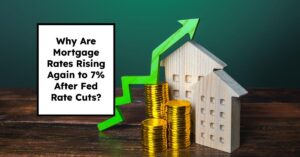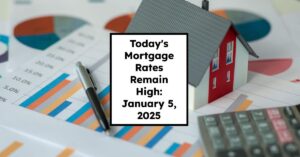When it comes to securing a home loan, understanding today’s mortgage rates is crucial for making informed financial decisions. As of January 8, 2025, average mortgage rates have seen a slight shift, with the 30-year fixed mortgage rate sitting at 7.02%, an increase from last week. Let's delve deeper into today's mortgage rates, the prospects of rates dropping, and what factors are at play.
Today's Mortgage Rates Drop: January 8, 2025
Key Takeaways
- Today’s average mortgage rates by Bankrate:
- 30-year fixed: 7.02%
- 15-year fixed: 6.34%
- 5/1 ARM: 6.42%
- Jumbo loan: 7.04%
- Rates have mostly decreased compared to last week, with exceptions for the 30-year fixed rate slightly increasing.
- Experts predict a gradual decline in mortgage rates throughout 2025, although they are unlikely to fall below 6%.
- The Federal Reserve influence remains significant, as they continue to make adjustments in response to economic conditions.
- Monthly payments vary significantly based on the mortgage type and can impact your overall budget.
Understanding Mortgage Rates
Mortgage rates are influenced by various factors, including economic conditions, inflation, and Federal Reserve policies. Each of these factors can create ripples across the mortgage landscape, affecting how much borrowers pay over the life of their home loans. As consumer demand for housing fluctuates and economic indicators shift, mortgage rates can also change.
Current Mortgage Rates Overview
Here are the average mortgage rates as of January 8, 2025, based on data from sources, including Bankrate:
| Mortgage Type | Today's Rate | Last Week’s Rate | Change |
|---|---|---|---|
| 30-year fixed | 7.02% | 7.01% | +0.01 |
| 15-year fixed | 6.34% | 6.35% | -0.01 |
| 5/1 Adjustable Rate Mortgage | 6.42% | 6.52% | -0.10 |
| 30-year fixed jumbo | 7.04% | 7.08% | -0.04 |
Monthly Payments and Their Impact
The cost of borrowing money through a mortgage doesn't just depend on the rate; it affects how much you pay monthly. Here’s how these rates translate into monthly payments for each type of mortgage when borrowing $100,000:
- 30-Year Fixed Mortgage: At a rate of 7.02%, the monthly payment (principal and interest) is approximately $666.65.
- 15-Year Fixed Mortgage: The payment drops to about $862 at 6.34% due to the shorter loan duration.
- 5/1 ARM: At 6.42%, the payment becomes about $627.
- Jumbo Mortgage: With a rate of 7.04%, anticipate a payment of roughly $667.99.
With these figures, you can see that opting for different mortgage types can significantly affect your monthly budget.
Will Mortgage Rates Drop in January 2025?
Looking forward, many experts predict that mortgage rates will gradually decline throughout 2025. A recent comprehensive analysis indicates that while rates have started the year on a high note, with the average 30-year fixed mortgage rate resting at 7.02%, various indicators suggest improvements might be on the horizon. Notably, organizations such as the Mortgage Bankers Association and Fannie Mae have adjusted their forecasts, hinting at a gradual drop in rates as the year progresses (U.S. News).
Recommended Read:
Mortgage Rate Predictions January 2025: Forecast for Homebuyers
These predictions stem from the Federal Reserve's actions. Despite several rate cuts in late 2024, mortgage rates have remained stubbornly high. Still, analysts believe that if the economy continues to stabilize and inflation eases, we could see reductions in mortgage rates later in the year, possibly stabilizing around 6%.
Factors Influencing Current Mortgage Rates
Understanding the mechanics of mortgage rates requires considering the factors that influence them. Key components include:
- Federal Reserve's Monetary Policy: The Fed's decisions significantly influence your mortgage. Their reductions in rates traditionally aim to stimulate economic growth, but it doesn't always translate directly to mortgage rates due to the broader economic conditions.
- Economic Indicators: Aspects such as inflation, unemployment rates, and GDP growth affect market confidence and, subsequently, mortgage rates. For example, strong job growth may indicate rising inflation, which can lead to higher mortgage rates.
- Geopolitical Events: The uncertainty stemming from international relations can impact the economy and, by extension, mortgage rates. Events such as conflicts or trade agreements can shift the market dynamics.
The Bigger Picture: Historical Context of Mortgage Rates
The picture of mortgage rates can be brightened with perspective. Over the past few decades, rates have fluctuated significantly. For instance, in the early 1980s, rates exceeded 18%, while rates during the pandemic dipped well below 3%, creating an unprecedented environment for borrowers. Today’s rates, while higher than pandemic lows, remain reasonable compared to historical averages.
Analyzing these historical trends helps buyers see the bigger picture. For example, many homebuyers today may feel frustrated with the current rates; however, understanding that rates can fluctuate provides reassurance that markets do recover and improve.
Predictions and Insights Moving Forward
Despite some analysts cautioning about potential stalling in rate cuts, it’s generally expected that mortgage rates should start to decline as the economy stabilizes in 2025. Greg McBride, Chief Financial Analyst at Bankrate, suggests that although rates will largely rely on the Fed’s policies and economic performance, homebuyers should prepare for a year where rates may not drop below 6%, but can still experience gradual declines through thoughtful monitoring of economic trends.
Summary:
As we navigate through January 2025, the average mortgage rates reflect a varied landscape with slight increases in the 30-year fixed category balanced by decreases in others. Borrowers should remain vigilant and informed, especially with upcoming economic reports and Fed meetings that will undoubtedly impact these rates further. Understanding the forces driving these trends is vital for anyone looking to purchase or refinance.
Work with Norada in 2025, Your Trusted Source for
Real Estate Investing
With mortgage rates fluctuating, investing in turnkey real estate
can help you secure consistent returns.
Expand your portfolio confidently, even in a shifting interest rate environment.
Speak with our expert investment counselors (No Obligation):
(800) 611-3060
Recommended Read:
- NAR Predicts 6% Mortgage Rates in 2025 Will Boost Housing Market
- Mortgage Rates Predictions for 2025: Expert Forecast
- Half of Recent Home Buyers Got Mortgage Rates Below 5%
- Mortgage Rates Need to Drop by 2% Before Buying Spree Begins
- Will Mortgage Rates Ever Be 3% Again: Future Outlook
- Mortgage Rates Predictions for Next 2 Years
- Mortgage Rate Predictions for Next 5 Years
- Mortgage Rate Predictions for 2025: Expert Forecast
- Prediction: Interest Rates Falling Below 6% Will Explode the Housing Market
- Mortgage Rate Predictions: Why 2% and 3% Rates are Out of Reach
- How Lower Mortgage Rates Can Save You Thousands?
- How to Get a Low Mortgage Interest Rate?
- Will Mortgage Rates Ever Be 4% Again?

![Top 20 Hottest Housing Markets Predicted for the Next Year [2025]](https://www.noradarealestate.com/wp-content/uploads/2024/07/hottest-housing-markets-2025-300x157.jpeg)









